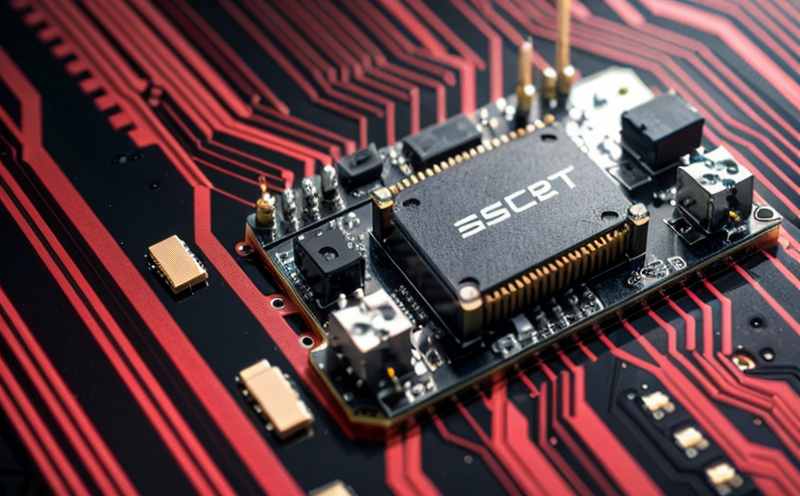NIST SP 800 53 Embedded Hardware Security Control Testing
The National Institute of Standards and Technology Special Publication 800-53 (NIST SP 800-53) provides a comprehensive framework for securing the use of information technology in federal agencies. The publication focuses on establishing security controls that are designed to address privacy, confidentiality, integrity, availability, accountability, and management practices. Among these security controls, specific attention is given to embedded hardware security, which is critical for protecting sensitive data and ensuring system reliability.
Embedded systems form the backbone of many modern devices, from medical equipment to automotive components. However, as technology advances, so too do the methods by which it can be compromised. The NIST SP 800-53 framework offers a robust set of guidelines for testing embedded hardware security controls. This service ensures that your organization's products meet stringent cybersecurity standards and are resistant to potential threats.
Our testing approach is designed to identify vulnerabilities early in the product development cycle, allowing for timely corrective actions. By leveraging NIST SP 800-53 as a benchmark, we can provide detailed analysis of hardware security controls, ensuring compliance with industry best practices and regulatory requirements. Our team of experts uses advanced tools and methodologies to simulate real-world attack vectors, providing you with a thorough understanding of your product's security posture.
The testing process involves multiple stages, each designed to address different aspects of the embedded hardware security lifecycle. From initial threat modeling through to final validation, we ensure that every phase is covered comprehensively. This includes evaluating cryptographic algorithms, secure boot processes, and data protection mechanisms. Our rigorous approach ensures not only compliance with NIST SP 800-53 but also adherence to other relevant standards such as ISO/IEC 27001 and IEC 62443.
By engaging our service, you gain access to state-of-the-art testing facilities equipped with the latest technology. Our team of experienced professionals brings deep industry knowledge and hands-on experience in conducting embedded hardware security tests. They work closely with your R&D engineers to ensure that all tests are tailored specifically for your product's unique requirements.
Our comprehensive suite of services includes:
- Threat modeling and risk assessment
- Cryptographic algorithm validation
- Secure boot process evaluation
- Data protection mechanism analysis
- Compliance with NIST SP 800-53 standards
- Integration of additional relevant industry standards
- Reporting and documentation generation
The outcome of our testing is a detailed report that provides actionable insights into how your product measures up against current best practices. This report serves as both an internal resource for continuous improvement and an external validation document when presenting to potential customers or regulatory bodies.
Scope and Methodology
| Aspect | Description |
|---|---|
| Data Collection | We collect baseline data on the hardware components, including their cryptographic capabilities and communication protocols. |
| Threat Modeling | This involves identifying potential threats based on the product's architecture and operational environment. |
| Vulnerability Assessment | Using NIST SP 800-53 as a guide, we assess vulnerabilities in hardware security controls. |
| Test Execution | The actual testing of the embedded hardware using simulated attack vectors and real-world scenarios. |
| Analysis & Reporting | A thorough analysis of test results followed by detailed reporting outlining any deficiencies found along with recommendations for remediation. |
The methodology we employ ensures that every aspect of the embedded hardware is thoroughly examined. From the initial stages where baseline data is collected through to final validation, each step is meticulously documented and reviewed. This approach guarantees accuracy and reliability in our findings.
Competitive Advantage and Market Impact
The demand for secure embedded systems continues to grow as technology becomes more integrated into everyday life. In this competitive landscape, companies that demonstrate a commitment to cybersecurity are at an advantage. By offering NIST SP 800-53 compliant embedded hardware security testing services, we help our clients stay ahead of the curve.
Compliance with these standards not only protects proprietary information but also enhances customer trust and satisfaction. It demonstrates your organization's dedication to maintaining high levels of integrity and reliability within its products. Such adherence can significantly impact brand perception positively among consumers who value security above all else.
In addition, demonstrating compliance through our rigorous testing process provides tangible evidence that can be used in marketing materials or when interacting with regulatory bodies. This can open doors to new markets and partnerships while reinforcing your company's reputation as a leader in cybersecurity.
Use Cases and Application Examples
- Critical infrastructure protection (e.g., power plants)
- Medical device security (e.g., pacemakers)
- Automotive safety systems (e.g., anti-lock braking systems)
- Consumer electronics (e.g., smart home devices)
| Use Case | Description |
|---|---|
| Critical Infrastructure Protection | Ensure that industrial control systems remain secure against unauthorized access. |
| Medical Device Security | Guarantee patient data privacy and integrity in healthcare settings. |
| Automotive Safety Systems | Protect vehicle electronics from cyber threats while maintaining optimal performance. |
| Consumer Electronics | Enhance the security of personal devices to protect user information. |
The versatility and importance of embedded hardware across various industries make it essential for manufacturers to implement robust security measures. Our service ensures that these critical components are rigorously tested, providing peace of mind knowing they meet stringent cybersecurity standards.





